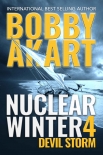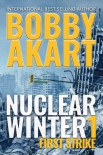Nuclear Winter Devil Storm by Bobby Akart (great novels txt) 📗

- Author: Bobby Akart
Book online «Nuclear Winter Devil Storm by Bobby Akart (great novels txt) 📗». Author Bobby Akart
Additional policy implications come from the risk of permanent harm to human civilization. If society takes this risk seriously, then it should go to great lengths to reduce the risk. It could stockpile food to avoid nuclear famine or develop new agricultural paradigms that can function during nuclear winter.
And it could certainly ratchet up its efforts to improve relations between nuclear weapon states. These are things that we can do right now even while we await more detailed research on nuclear winter risk.
Against that backdrop, I hope you’ll be entertained and informed by this fictional account of the world thrust into Nuclear Winter. God help us if it ever comes to pass.
Real-World News Excerpts
THE COUNTDOWN TO AN ISRAELI WAR WITH IRAN HAS BEGUN
~ Foreign Policy Magazine, May 2021
The Israelis believe that the results of America's foreign policy will strengthen the rogue Iranian regime that is committed to Israel’s destruction, while paving its path to obtaining and using nuclear weapons.
Tal Kelman, the general in charge of the IDF’s Iran strategy, was asked in an interview recently if Israel has the ability to attack and completely destroy Iran’s nuclear program. He responded without hesitation: “The answer is yes. When we build these capabilities, we build them to be operational. It’s not that there aren’t many strategic dilemmas, since the day after Iran can go back to the plan, but the ability exists.
In reaching the conclusion that their best ally, the United States, has chosen a course the Israelis fervently believe will end up increasing that threat rather than containing it will only confirm their view that Israel is on its own when it comes to stopping Iran’s march to the bomb and that its operational planning to act military to defeat it must be accelerated.
The risk of war in the Middle East is almost certainly rising.
INDIA – PAKISTAN CONFLICT: A TICKING TIME BOMB
~ Deutsche Welle, May 2021
India and Pakistan are trying to improve relations, but decades of hostility over territorial and ideological disputes hold progress back.
After the last American soldier departs Afghanistan this year, India and Pakistan will be left with some very difficult, unsavory choices. They must attempt to maintain their autonomy while the government in Afghanistan allows the Taliban to gain an upper hand. It will not be long before the Taliban exerts its will in Pakistan.
This scenario directly threatens India’s political, security, and economic interests. It will pave the way for the Indian government to insert itself in Pakistan’s affairs through possible military action against the Taliban. These changing dynamics are sure to create increased tensions between New Delhi and Islamabad, two nuclear powers.
MISSILES AND WARHEADS IN THE GROUND ARE NO WAY TO DETER NUCLEAR WAR NOW
~ Los Angeles Times, April 19, 2021
Across five Western states — under farmland, windblown fields of grazing cattle and Great Plains plateaus — 400 aging nuclear-armed ballistic missiles stand at the ready. From a distance, the isolated, fenced-off areas look like they might be for wells pumping water, or fiber optic cable repeaters. What is underground, however, is neither water nor the internet, but weapons so powerful that if used or attacked, it could alter global climate and end civilization.
Nuclear weapons today have only one purpose: to deter the other side from using theirs while governments work to prevent their spread and ultimately end them as a threat to the world.
If there were any doubts, the latest studies about how nuclear war could alter world climate suggest that even what’s considered a small war — involving several hundred weapons — could produce “nuclear winter,” shattering the planet’s food supply and setting off an unprecedented famine with devastating global repercussions. The economic, social and governmental collapse would mean the end of civilization as we know it, suicide for humanity.
HOW A SMALL NUCLEAR WAR WOULD TRANSFORM THE ENTIRE PLANET
~ Nature Magazine, updated May 2021
As geopolitical tensions rise in nuclear-armed states, scientists are issuing warnings on the global impact of nuclear war. The hypothetical:
It all starts in 2025, as tensions between India and Pakistan escalate over the contested region of Kashmir. When a terrorist attacks a site in India, that country sends tanks rolling across the border with Pakistan. As a show of force against the invading army, Pakistan decides to detonate several small nuclear bombs.
The next day, India sets off its own atomic explosions and within days, the nations begin bombing dozens of military targets and then hundreds of cities. Tens of millions of people die in the blasts.
That horrifying scenario is just the beginning. Smoke from the incinerated cities rises high into the atmosphere, wrapping the planet in a blanket of soot that blocks the Sun’s rays. The planet plunges into a deep chill. For years, crops wither from California to China. Famine sets in around the globe.
The worst impact would come in the mid-latitudes, including breadbasket areas such as the US Midwest. Grain reserves would be gone in a year or two. Most countries would be unable to import food from other regions because they, too, would be experiencing crop failures. The researchers did not explicitly calculate how many people would starve, but say that the ensuing famine would be worse than any in documented history.
The bottom line remains that a war involving less than 1% of the world’s nuclear arsenal could shatter the planet’s food supplies. “The surprising finding”, said one researcher, “is that even a small-war scenario has devastating global repercussions.”
Contents
Epigraph
Part I
Chapter 1
Chapter 2
Chapter 3
Chapter 4
Chapter 5
Chapter 6
Chapter 7
Chapter 8
Chapter 9
Chapter 10
Chapter 11
Chapter 12
Part II
Chapter 13
Chapter 14
Chapter 15
Chapter 16
Chapter 17
Chapter 18
Chapter 19
Chapter 20
Chapter 21
Chapter 22
Chapter 23
Chapter 24
Chapter 25
Chapter 26
Part III
Chapter 27
Chapter 28
Chapter 29
Chapter 30
Chapter 31
Chapter 32
Chapter 33
Chapter 34
Chapter 35
Chapter




Comments (0)